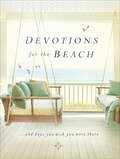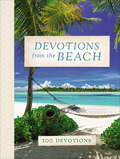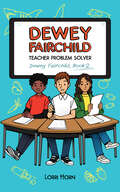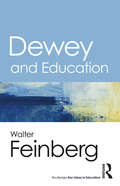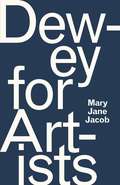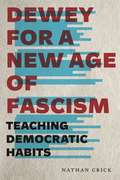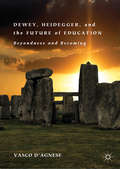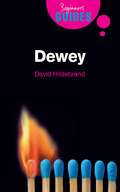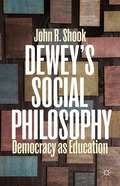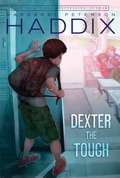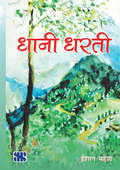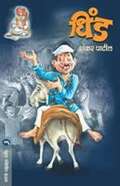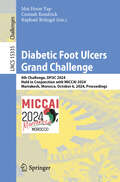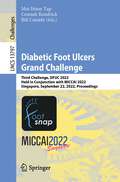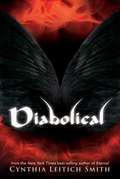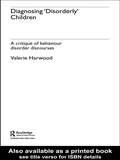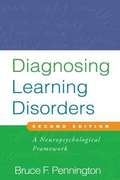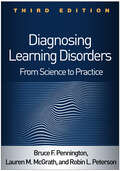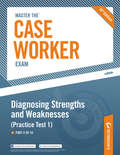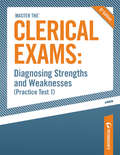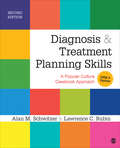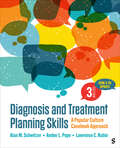- Table View
- List View
Devotions for the Beach . . . and Days You Wish You Were There
by Thomas NelsonDig your feet in the sand and let the water cool your toes as you escape into the beauty of God’s seaside creations, and hear His voice more clearly than perhaps anywhere else. There’s nothing quite like the warmth and relaxation of the beach—away from the stresses of the world and into a place of peace and refreshment. Devotions for the Beach is the gentle breeze that takes you there, to see the majesty of God and to open your heart and soul to the One who created it all. These ninety devotions explore the parallels of life with the elements of the shore to help you see God, to find hope, to draw strength, and to rest in the comfort of His arms throughout your day. Included are striking photographs with a fresh, contemporary design for timeless appeal. Every woman will want a copy of this book as a gentle reminder of days at the beach and the call of God’s love.
Devotions from the Beach: 100 Devotions (Devotions From ... Ser.)
by Thomas NelsonLife is better at the beach--but you already knew that. Escape with a beach read focused on the beauty of God's seaside wonders. The stunning photography and devotions will take you right to the water's edge, where God's voice is often clearer than ever.Devotions from the Beach is a beautiful gift with:100 devotions focused on the beachGorgeous photographyLife parallels with elements of the shoreMessages of hope, comfort, strength, and restThis beautiful book gives you a front-row seat to God's majestic creation. So breathe deeply and open your heart and soul to the One who shaped it all. Devotions from the Beach is the perfect gift for every beach lover, women who appreciate gentle reminders of days at the beach and the call of God's love, and anyone who finds peace standing beside the ocean.Other books in the Devotions from… series include Devotions from the Mountains, Devotions from the Lake, Devotions from the Front Porch, Devotions from the Kitchen Table, and Devotions from the Garden.
Dewey Fairchild, Teacher Problem Solver (Dewey Fairchild #2)
by Lorri HornGenius problem solver Dewey takes up the challenge after a client shows up desperate to pacify his teacher. In this follow-up to Dewey Fairchild, Parent Problem Solver, It turns out that tons of kids have troublesome teachers, so he's soon up to his neck in cases—from classic cases of teachers who are soo boring to bizarre cases like the teacher who leaves students scared of water—even water fountains. Meanwhile, Dewey's school starts limiting toilet paper use—to just one tiny square at a time!—and replaces Dewey's beloved vending machines with . . . a garden. That's no substitute for the delightful snacks Dewey lives for, so he and his best friends protest with a secret demonstration involving edible additions to school property. But detention may be the least of their problems when some argue their actions were vandalism. Will their demands for student involvement sway the administration, or will they be caught and punished with detention . . . or worse?
Dewey and Education (Routledge Key Ideas in Education)
by Walter FeinbergDewey and Education presents Dewey’s perspectives on moral psychology and development, human nature, and democratic community-building as they inform the influential philosopher’s deep commitment to educational reform. In this personal yet far-reaching account, Walter Feinberg relates Dewey’s work both to contemporary social and political affairs and to his own philosophical and political commitments. Written for scholars and students of the Philosophy of Education, Educational Policy Studies, and Political Theory, this book is indispensable as a guide to Dewey’s influence on democratic education.
Dewey for Artists
by Mary Jane JacobJohn Dewey is known as a pragmatic philosopher and progressive architect of American educational reform, but some of his most important contributions came in his thinking about art. Dewey argued that there is strong social value to be found in art, and it is artists who often most challenge our preconceived notions. Dewey for Artists shows us how Dewey advocated for an “art of democracy.” Identifying the audience as co-creator of a work of art by virtue of their experience, he made space for public participation. Moreover, he believed that societies only become—and remain—truly democratic if its citizens embrace democracy itself as a creative act, and in this he advocated for the social participation of artists. Throughout the book, Mary Jane Jacob draws on the experiences of contemporary artists who have modeled Dewey’s principles within their practices. We see how their work springs from deeply held values. We see, too, how carefully considered curatorial practice can address the manifold ways in which aesthetic experience happens and, thus, enable viewers to find greater meaning and purpose. And it is this potential of art for self and social realization, Jacob helps us understand, that further ensures Dewey’s legacy—and the culture we live in.
Dewey for a New Age of Fascism: Teaching Democratic Habits (Rhetoric and Democratic Deliberation #22)
by Nathan CrickDuring the rise of fascism in the early twentieth century, American philosopher and educational reformer John Dewey argued that the greatest threat to democracy was not a political regime or even an aggressive foreign power but rather a set of dispositions or attitudes. Though not fascist in and of themselves, these habits of thought—rugged individualism and ideological nationalism—lay the foundation for fascism. In this study, Nathan Crick uses Dewey’s social thought and philosophy of education to provide insight into and resources for transforming our present-day politics.Through a close reading of Dewey’s political writings and educational theory, Crick elaborates Dewey’s vision of democratic social life and the education required for its foundation. He shows that for Dewey, communication is essential to cultivating sympathy, intelligence, and creativity—habits of thought that form the core of democratic culture. Crick then lays out a broad curriculum of logic, aesthetics, and rhetoric for inculcating these habits in the classroom, arguing that if we are to meet the challenge of fascism, we must teach these new arts as if our civilization depends on it—because in our new age of politics, it does.Comprehensive and pragmatic, this book presents an experimental model of education that can be applied across the humanities curriculum. It will be of interest to teachers of writing, composition, and rhetoric as well as scholars and students of communication studies, pedagogy, and political theory.
Dewey for a New Age of Fascism: Teaching Democratic Habits (Rhetoric and Democratic Deliberation)
by Nathan CrickDuring the rise of fascism in the early twentieth century, American philosopher and educational reformer John Dewey argued that the greatest threat to democracy was not a political regime or even an aggressive foreign power but rather a set of dispositions or attitudes. Though not fascist in and of themselves, these habits of thought—rugged individualism and ideological nationalism—lay the foundation for fascism. In this study, Nathan Crick uses Dewey’s social thought and philosophy of education to provide insight into and resources for transforming our present-day politics.Through a close reading of Dewey’s political writings and educational theory, Crick elaborates Dewey’s vision of democratic social life and the education required for its foundation. He shows that for Dewey, communication is essential to cultivating sympathy, intelligence, and creativity—habits of thought that form the core of democratic culture. Crick then lays out a broad curriculum of logic, aesthetics, and rhetoric for inculcating these habits in the classroom, arguing that if we are to meet the challenge of fascism, we must teach these new arts as if our civilization depends on it—because in our new age of politics, it does.Comprehensive and pragmatic, this book presents an experimental model of education that can be applied across the humanities curriculum. It will be of interest to teachers of writing, composition, and rhetoric as well as scholars and students of communication studies, pedagogy, and political theory.
Dewey, Heidegger, and the Future of Education: Beyondness and Becoming
by Vasco d'AgneseDrawing on insights into the philosophies of Dewey and Heidegger, this book moves forward the greater philosophical discourse surrounding education. It illuminates deep affinities between the corresponding traditions of Dewey and Heidegger, broadly labeled hermeneutics and pragmatism, and in doing so reveals the potential of the Dewey-Heidegger comparison for the future of education. To accomplish this task, Vasco d’Agnese explores the Deweyan and Heideggerian understanding of existence and experience. Both thinkers believed that humans are vulnerable from the very beginning, delivered to an uncanny and uncertain condition. On the other hand, such an uncanniness and dependency, rather than flowing in nihilistic defeat of educational purposes, puts radical responsibility on the side of the subject. It is, then, educationally promising. The book explains that for both Dewey and Heidegger, being a subject means being-with-others while transcending and advancing one’s boundaries, thus challenging the managerial framework of education that currently dominates educational institutions throughout the world.
Dewey: A Beginner's Guide (Beginner's Guides)
by David HildebrandAn icon of philosophy and psychology during the first half of the 20th century, Dewey is known as the father of Functional Psychology and a pivotal figure of the Pragmatist movement as well as the progressive movement in education. This concise and critical look at Dewey's work examines his discourse of "right" and "wrong," as well as political notions such as freedom, rights, liberty, equality, and naturalism. The author of several essays about thought and logic, Dewey's legacy remains not only through the works he left us, but also through the institutions he founded, which include The New School for Social Research in New York City and the University of Chicago Laboratory Schools. Hildebrand's biography brilliantly interweaves the different strands of Dewey's thought, and examines the legacy he left behind. David L. Hildebrand is Assistant Professor of Philosophy at the University of Colorado at Denver and Health Sciences Center. He has also taught at Rice University, The University of Memphis, and the University of Houston.
Dewey�s Social Philosophy
by John R. ShookDewey advanced a political vision for democracy as a form of deliberative polyarchy grounded in community ethics. This vision depicts citizens engaged in communal exercises in experimental civic education. This ethical project, to successfully pervade all of democratic society must be revolutionarily comprehensive. Maintaining the civil peace, a productive economy, a participatory citizenry, an effective penal system, and a religiously harmonious society are top democratic priorities. The economy needs employees and entrepreneurs who are more broadly educated, not merely well-trained; education is so crucial for empowerment that it must be a civic guarantee; education should be prioritized in law and criminal justice; and education is crucial for ethical communities embracing religious pluralism. Dewey's core views on humanity's capacities for learning, socializing, problem-solving, self-ruling, and flourishing forge a whole far greater than its parts. His progressive revolution is yet to be realized, but his philosophy remains just as insightful and relevant as ever.
Dexter the Tough
by Margaret Peterson Haddix"I'm the new kid. I am tuf. This morning I beat up a kid". It's only the first day of school for Dexter, but he's already mad at the principal, and the secretary, and the janitor, and the kids who laugh at him. When his teacher tells the class to write a story, Dexter writes about how tough he is -- and how he's already gotten into a fight. Is any of Dexter's story true? Why was the other boy crying before Dexter hit him? And why would the other boy still want to be Dexter's friend? Even Dexter doesn't know the answers to some of those questions. But as he deals with family problems, a persistent teacher, and a boy who's strangely interested in floor wax, he discovers many surprises hidden in his own tale.
Dhan-Sampatti Ka Manovigyan: धन-संपत्ति का मनोविज्ञान
by Morgan Houselधन का प्रबंधन, निवेश और उद्यम संबंधी निर्णय लेना ऐसे विषय माने जाते हैं जिनमें आमतौर पर काफी गणितीय हिसाब किताब होता है, जहाँ डेटा और फ़ॉर्मूले हमें बताते हैं कि आखिर क्या करना है। लेकिन वास्तविक संसार में, लोग वित्तीय निर्णय स्प्रेडशीट पर नहीं लेते। वे खाने की मेज पर या किसी सभाकक्ष में उन्हें बनाते हैं, जहाँ व्यक्तिगत इतिहास, संसार के प्रति आपका अद्वितीय दृष्टिकोण, अहंकार, अभिमान, मार्केटिंग, और विचित्र प्रेरक साथ में उलझे होते हैं। धन-संपत्ति के मनोविज्ञान में लेखक ने 19 लघु कहानियाँ प्रस्तुत की हैं, जो धन के बारे में लोगों की विचित्र सोच का समन्वेषण करती है, और साथ ही आपको सिखाती हैं कि आप किस प्रकार जीवन के इस सवाधिक महत्वपूर्ण पहलू को बेहतर रूप से समझ सकते हैं।
Dhani Dharati
by Ishaan Mahesh“धानी धरती—श्री ईशान महेश का बाल-उपन्यास है। इसका केंद्रभूत विषय पर्यावरण के लिए सजगता और बाल-सुलभ उत्साह है। यह पुस्तक उपन्यास के रूप में पर्यावरण रक्षा के तमाम बिंदुओं को रोचक तरीके से प्रस्तुत करने की दृष्टि से बेहद उपयोगी है।
Dhind FYBA - SPPU: धिंड एफ.वाय.बी.ए. - सावित्रीबाई फुले पुणे यूनिवर्सिटी
by Shankar Patil“म्या दारूला शिवलो न्हाई. शप्पत सांगतो, मी घेतल्याली न्हाई. उगा इनाकारणी माज्यावर अदावत घेऊ नका.” राऊ खोतानं साफ झिडकारलं तशी ती सारी चावडी खालवर झाली. लोक खदाखदा हसू लागले आणि राऊ खोतच म्हणाला, “हसून दावू नका. खरं सांगतो. मी घेतल्याली न्हाई.” रामभाऊ हसून म्हणाले – “गड्या, तुझ डोळं सांगत्यात की रं!” “अण्णा, डोळं काय सांगत्यात? गपा, उगच गप्प् बसा.” “उतरंस्तवर गप् बसावं म्हणतोस व्हय राऊ?” “अहो, काय चढलीया काय मला?” “अजून चढली न्हाई म्हणतोस?” “अहो, त्याचं नावसुदिक घेऊ नगा. शिवल्याला न्हाई म्या त्याला!” एक सनदी पुढं झाला आणि मोठ्यानं म्हणाला, “शिवल्यालं न्हाई, तर मग दडून का बसला होतास?” “शेबास! मी काय दडून बसलो होतो काय?” “दडला नव्हतास तर मग माळ्यावर काय करत होतास?” “माळ्यावर काय करतोय! गडद झोपलो होतो?” “मग खाली जागा नव्हती काय?” “ते तुम्हाला काय करायचं? आम्ही खाली झोपू न्हाईतर वर झोपू!” राऊ असं आडवं बोलला आणि सबंध चावडी पोट धरून हसू लागली.
Diabetic Foot Ulcers Grand Challenge: 4th Challenge, DFUC 2024, Held in Conjunction with MICCAI 2024, Marrakesh, Morocco, October 6, 2024, Proceedings (Lecture Notes in Computer Science #15335)
by Moi Hoon Yap Connah Kendrick Raphael BrüngelThis book constitutes the 4th Challenge on Diabetic Foot Ulcers, DFUC2024, held in conjunction with the 27th International Conference on Medical Image Computing and Computer-Assisted Intervention, MICCAI 2024, in Marrakesh, Morocco, on October 6, 2024. The 8 full papers presented in this book together with 2 invited papers were carefully reviewed and selected from 11 submissions. The task of DFUC 2024 was on self-supervised learning in ulcer segmentation, for the purpose of supporting research towards more advanced methods to overcome data deficiency and unlabelled data.
Diabetic Foot Ulcers Grand Challenge: Third Challenge, DFUC 2022, Held in Conjunction with MICCAI 2022, Singapore, September 22, 2022, Proceedings (Lecture Notes in Computer Science #13797)
by Moi Hoon Yap Bill Cassidy Connah KendrickThis book constitutes the Third Diabetic Foot Ulcers Grand Challenge, DFUC 2022, which was held on September 2022, in conjunction with the 25th International Conference on Medical Image Computing and Computer-Assisted Intervention, MICCAI 2022 in Singapore. The 8 full papers presented together with 5 challenge papers and 3 post-challenge papers included in this book were carefully reviewed and selected from 19 submissions.The DFU challenges aim to motivate the health care domain to share datasets, participate in ground truth annotation, and enable data-innovation in computer algorithm development. In the longer term, it will lead to improved patient care.
Diabolical (Tantalize #4)
by Cynthia Leitich SmithPrepare for a hell of a ride as Cynthia Leitich Smith calls on characters from her previous novels - and conjures up new ones - for a climactic showdown. When "slipped" angel Zachary and his werewolf pal, Kieren, arrive under suspicious circumstances to a mysterious New England boarding school, they quickly find themselves in a hellish lockdown with an intriguing assortment of secretive, hand-picked students. Plagued by demon dogs, hallucinatory wall décor, a sadistic instructor, and a legendary fire-breathing monster, will they somehow manage to escape? Or will the devil have his due? Best-selling author Cynthia Leitich Smith unites heroes from the previous three novels in the Tantalize Series - including Zachary's girl, Miranda, and Kieren's love, Quincie - along with a fascinating cast of all-new characters for a suspenseful, action-packed clash between the forces of heaven and hell.
Diagnosing 'Disorderly' Children: A critique of behaviour disorder discourses
by Valerie HarwoodBased on the author's in-depth research with children diagnosed with behavioural difficulties, this book provides a thorough critique of today's practices, examining: the traditional analyses of behavioural disorders and the making of disorderly children the influence of the 'expert knowledge' on behavioural disorders and its influence on schools, communities and new generations of teachers the effect of discourses of mental disorder on children and young people the increasing medicalisation of young children with drugs such as Ritalin. This book offers an innovative and accessible analysis of a critical issue facing schools and society today, using Foucaultian notions to pose critical questions of the practices that make children disorderly. Rich in case studies and interviews with children and young people, it will make fascinating reading for students, academics and researchers working in the field of education, inclusion, educational psychology, sociology and youth studies.
Diagnosing Learning Disorders, Second Edition
by Bruce PenningtonFrom a trusted expert in the field, this authoritative work provides an accessible overview of what learning disorders are, how they develop, and how to diagnose and treat them effectively. The author presents the most current neuroscientific knowledge on a range of conditions, including dyslexia, autism spectrum disorders, attention-deficit/hyperactivity disorder, and others. Practitioners gain vital insights and tools for making sense of children's impairments and strengths, collecting and interpreting diagnostic data from a variety of sources, and linking diagnosis to evidence-based interventions. The second edition has been substantially revised and expanded to reflect significant clinical and research advances. New to This Edition Covers additional disorders intellectual disability, mathematics disorder, and developmental coordination disorder, plus a chapter on less well-validated disorders. New case illustrations and a focus on empirically based practice. Now grounded in a multiple cognitive-deficit model of learning disorders, replacing the prior edition's modular, single-deficit model. An illuminating chapter on controversial therapies separates myths from facts.
Diagnosing Learning Disorders, Third Edition: From Science to Practice
by Bruce F. Pennington Lauren M. McGrath Robin L. PetersonA definitive reference--now extensively revised with 70% new material--this book presents cutting-edge knowledge on how learning disorders develop and how to diagnose and treat them effectively. In additional to dyslexia and mathematics disabilities, the book covers speech and language disorders, attention-deficit/hyperactivity disorder, autism spectrum disorder, and intellectual disability. Accessibly written, it is grounded in genetics, neuroscience, and developmental neuropsychology. Clinicians and educators are guided to make sense of children's impairments and strengths and make sound diagnostic decisions. Best practices in intervention are reviewed. User-friendly features include case examples and summary tables in each disorder-specific chapter. New to This Edition *Revised throughout to reflect major theoretical, empirical, and technological advances. *Chapters on etiology, brain development, and comorbidity. *Chapters on DSM-5 diagnosis of specific learning disorder, evidence-based assessment, and achievement gaps.
Diagnosing Strengths and Weaknesses
by PetersonPeterson’s Master the Case Worker Exam: Diagnosing Strengths and Weaknesses (Practice Test 1) is a diagnostic test designed to help you determine your strengths and weaknesses on the case worker exam. The practice test resembles those that many social worker candidates are required to pass during the job screening process. Peterson’s guide provides questions and answer explanations on Vocabulary, Reading Comprehension, English Grammar and Usage, Eligibility for Public Assistance, Housing and Social Welfare, Judgment, Public Health, Procedures and Records, Interpretation of Social Work Problems, Case Worker Techniques, and Social Work with Children.
Diagnosing Strengths and Weaknesses: Practice Test 1
by John J. NieszA guide for identifying your strengths and weaknesses when preparing for the GRE.
Diagnosis and Treatment Planning Skills (DSM-5 Update): A Popular Culture Casebook Approach (DSM-5 Update)
by Lawrence C. Rubin Dr Alan M. SchwitzerThe Second Edition of Alan M. Schwitzer and Lawrence C. Rubin’s Diagnosis and Treatment Planning Skills: A Popular Culture Casebook Approach comprehensively addresses the clinical thinking skills required in professional counseling settings through the innovative use of case examples drawn from popular culture. Fully revised to include DSM-5, the text begins with discussion of diagnosis, case conceptualization, and treatment planning, covering the interplay of individual clinical tools and their application in contemporary practice. Ten DSM-5 updated case illustrations follow, creating a streamlined new edition that engages students in a start-to-finish application of clinical tools.
Diagnosis and Treatment Planning Skills: A Popular Culture Casebook Approach
by Lawrence C. Rubin Alan M. Schwitzer Amber L. PopeThe Third Edition of Alan M. Schwitzer, Amber L. Pope, and Lawrence C. Rubin′s Diagnosis and Treatment Planning Skills: A Popular Culture Casebook Approach thoroughly covers essential clinical thinking skills in professional counseling through classic and contemporary popular culture case examples. Fully revised for use with the DSM-5-TR, the text begins with discussion of diagnosis, case conceptualization, and current treatment planning practices, covering the interplay of individual clinical tools and their application in contemporary practice. Twenty DSM-5-TR updated case illustrations follow, representing a diverse range of individual differences and intersecting identities. Students will engage with each case illustration in a start-to-finish application of clinical tools.
Diagnosis and Treatment Planning Skills: A Popular Culture Casebook Approach
by Lawrence C. Rubin Alan M. Schwitzer Amber L. PopeThe Third Edition of Alan M. Schwitzer, Amber L. Pope, and Lawrence C. Rubin′s Diagnosis and Treatment Planning Skills: A Popular Culture Casebook Approach thoroughly covers essential clinical thinking skills in professional counseling through classic and contemporary popular culture case examples. Fully revised for use with the DSM-5-TR, the text begins with discussion of diagnosis, case conceptualization, and current treatment planning practices, covering the interplay of individual clinical tools and their application in contemporary practice. Twenty DSM-5-TR updated case illustrations follow, representing a diverse range of individual differences and intersecting identities. Students will engage with each case illustration in a start-to-finish application of clinical tools.
